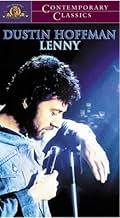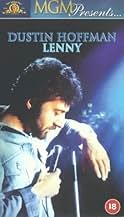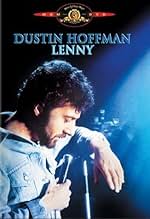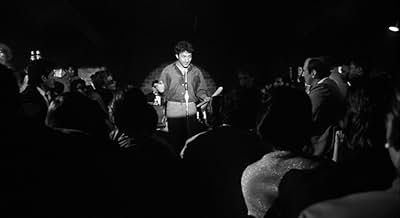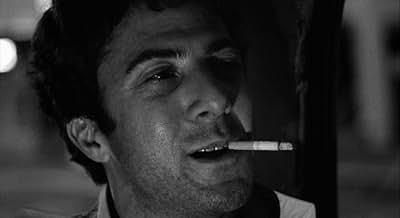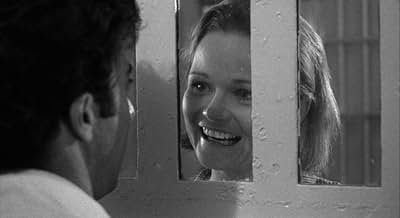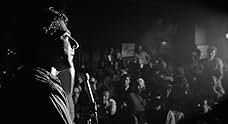Lenny
- 1974
- Tous publics
- 1h 51m
The story of acerbic 1960s comic Lenny Bruce, whose groundbreaking, no-holds-barred style and social commentary was often deemed by the Establishment as too obscene for the public.The story of acerbic 1960s comic Lenny Bruce, whose groundbreaking, no-holds-barred style and social commentary was often deemed by the Establishment as too obscene for the public.The story of acerbic 1960s comic Lenny Bruce, whose groundbreaking, no-holds-barred style and social commentary was often deemed by the Establishment as too obscene for the public.
- Nominated for 6 Oscars
- 7 wins & 17 nominations total
- Girl
- (as Kathie Witt)
- Hawaiian Judge
- (as Monroe Meyers)
Featured reviews
It is a fascinating film though, in its own way. Fosse uses a documentary-like approach, complete with black and white photography and a narrative device in which we see Bruce's long-suffering love (played heartbreakingly by Valerie Perrine, Lex Luthor's bikini-clad girlfriend in "Superman" [1978]) telling Bruce's story to a filmmaker while the actual events themselves are played out as flashbacks. Fosse was fond of this confessional type of storytelling and would use it again in "All That Jazz" (1979). Dustin Hoffman is simply sensational as Bruce; he utterly disappears into this caustic character until no trace of Hoffman the actor is left. Technically, everything about the film is highly accomplished, but it's so desolately grim as to be off putting.
Grade: B+
When seventies cinema was good, it was really, really good, and it is, at least acting-wise, only rarely rivaled in contemporary productions. As a character study and also as a snap shot of an era, 'Lenny' is essential viewing. 8 stars out of 10.
In case you're interested in more underrated masterpieces, here's some of my favorites:
imdb.com/list/ls070242495
**** (out of 4)
Bob Fosse's masterpiece takes a look at the short life of comic Lenny Bruce (Dustin Hoffman) who would die at the age of forty but not before breaking down certain doors for future comics. The film follows his rise up through the ranks thanks in large part to the controversy that followed him due to the nature of his act. I've always felt that LENNY was one of the best movies of the decade and even after all these years it's still a very sharp, at times funny but mostly sad look at a man who deserved much better than he ever got. There's no doubt in my mind that the film was like the light shining from above on both Fosse and Hoffman as the two were perfectly meant to bring this film to the screen and boy do they really deliver. Fosse's style here wouldn't work with most directors but the way he uses it to get to the emotion and power in the story is quite amazing. The film jumps back and forth through different periods of Bruce's life and the way Fosse uses this to build up the subject is something interesting to watch. Just take a look at a rather innocent scene where Bruce talks his wife into having a threesome with another woman. Just look at how the silence is used and the impact this has for this scene. Hoffman gives one of his greatest performances here, which is saying quite a bit considering how great he was during this period of his career. I thought he really did a remarkable job at not copying the real Lenny Bruce but instead taking him and forming him into this character. I thought Hoffman really gave an incredibly powerful and emotional performance and especially as Bruce begins to crack due to the pressures of the courts and the drugs. Valerie Perrine is also excellent in her role of Bruce's drug addicted wife. The B&W cinematography is some of the greatest you're ever going to see. This is certainly one of the most beautiful films you're ever going to see and especially the way the lighting is even in the simplest scenes. LENNY often gets beaten up by some critics because it's not 100% accurate but I've yet to see any bio pic that is. To me this is clearly one of the best movies of the decade and features one of the greatest performances you're going to see.
He was infamously arrested over a dozen or so times for speaking offensively in comedy clubs, and eventually began to represent himself in court. He never gained respect when he was alive, and so he died a frustrated, misunderstood soul who was simply far too ahead of his time.
The masses didn't get him. His racial jokes and political satire was misinterpreted and taken at face value. His sermons ridiculing religion drew hate from conservative Americans.
But Bruce enjoyed toying with words, and bending the typical perception of what they symbolized he cherished the impact they had on people. When Bruce said a certain four-letter expletive, it wasn't to purposely offend people it was to help liberate their ways of thinking. Words were an entryway - once he could knock people off-balance, he was free to go for the throat. He used foul language in the same way as he used words dealing with religion, homosexuals, politics and the world he used them to make a point. And it's a shame his point didn't resonate until after his death.
The makers of "Lenny" understood Bruce, though. They also understood his flaws as a human being, and the result is an unflinchingly honest biopic that paints a dark, staunch portrait of a troubled man. Dustin Hoffman presents Lenny as an alternately despicable and heroic figure, and there is a spark in his eyes throughout the early scenes of the movie that eventually gives way to desperation later in the picture. Hoffman is so convincing we forget we are watching an actor. He entirely embodies himself within Lenny Bruce, adapting all of the comic's tics and habits.
The movie is told from the perspective of those who knew Bruce his wife, Honey (Valerie Perrine), his aunt, and his manager. The narrative cuts back and forth between scenes with Lenny and interview segments, which we see through the eyes of an off-screen interviewer (whose voice is none other than the movie's director, Bob Fosse).
"Lenny" is an uncomfortable film, and it is not by any means perfect. The matter-of-fact narrative is a bit alienating and prevents us from getting entirely close to Bruce but that may very well have been the point. A more heartfelt biography of the performer perhaps would have restricted Fosse and screenwriter Julian Barry from divulging into Lenny's more seedy character traits such as when he coerces his unwilling wife into a threesome with another woman, later ridiculing her for doing so; or when he goes on stage completely drugged out of his mind and makes a fool of himself. If they had allowed audiences to empathize with Bruce to a greater degree, truth may have been sacrificed along the way. And although the narrative is rather cold, it's also unique sometimes refreshingly so.
Despite imperfections, "Lenny" is one of the better motion pictures of the 1970s and perhaps one of the movies that best capture the essence of cinema from a time when the mainstream and art-house were coexistent.
It is a typical 1970s production insofar as that it is grim, bleak and more depressing than any production you would have seen on the screen a decade earlier but it's an admirable feat. Fosse has a close grip on the direction and Hoffman and Perrine are both absolutely superb, bringing to life two very tortured souls who temporarily found solace in each other, before finding their relationship put to the test by drug abuse and self-loathing.
Lenny died from a heroin overdose in 1966. In 2003 he was granted a posthumous pardon by New York State for his most notable arrest in 1964, for an "obscene performance." It's a nice gesture, although one can't help but think it would have only really made a difference 40 years ago.
And the use of black and white was great. The movie did give Lenny the appreciation that he deserved, mainly by showing his troubled personal life and his troubles with the law. The movie portrayed the trouble and basically harassment that Lenny went through when he voiced his observations of society, which were true, but weren't quite ready to be heard yet. The only fault (if at all) of the film is that it didn't quite show Lenny's genius in what he did. It definitely showed his potential but not quite his brilliance. But this might be because it was a biography of sorts of his life which included his personal and public life. I suppose if the movie just focused on his comedic talents; than his genius would have been obvious, but that wasn't the focus of the film. All in all this is an excellent movie in what it attempted to do. It accomplished what it set out to do and that's what counts.
Did you know
- TriviaThe scene in which Lenny Bruce does his act in a raincoat, near the movie's end, came from a Lenny Bruce show that a student tape-recorded and sent to Dustin Hoffman. Bruce's lines are directly from the tape.
- GoofsDuring the movie's opening monologue, Lenny says that it's 1964 and then references Jerry Lewis's MDA Telethon, which debuted in 1966.
- Quotes
Lenny Bruce: What's the worst thing you can say to anybody? ''Fuck you, mister!'' That's really weird, because if l wanted to hurt you, l should say, ''Unfuck you, mister'' Because ''fuck you'' is really nice, man.
- ConnectionsFeatured in Precious Images (1986)
- How long is Lenny?Powered by Alexa
Details
Box office
- Budget
- $2,700,000 (estimated)
- Runtime
- 1h 51m(111 min)
- Color
- Sound mix
- Aspect ratio
- 1.85 : 1


